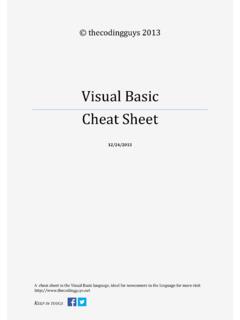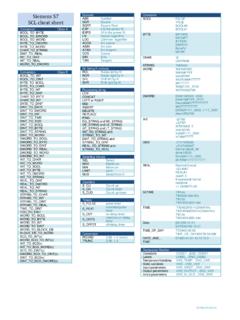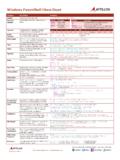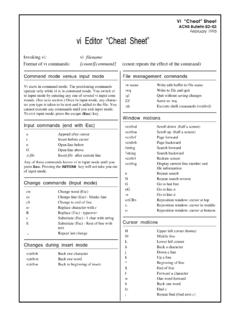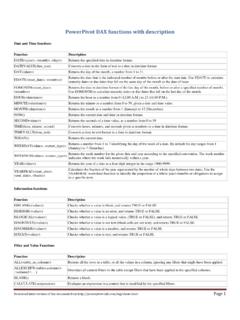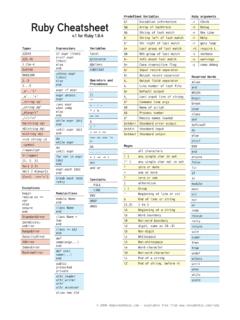Transcription of C# Cheat Sheet - the coding guys
1 KEEP IN TOUCH THECODINGGUYS 2013 C# Cheat Sheet 12/24/2013 A Cheat Sheet to the C# language, ideal for newcomers to the language for more visit TABLE OF CONTENTS LICENSE 3 LANGUAGE BASICS 4 Introduction 4 Variables 4 Syntax 4 Naming Rules 4 Example 4 Arrays 4 Syntax 4 Example 5 Strings 5 Concatenation 5 Example 5 New Line 5 Example 5 5 Example 5 CONDITIONAL STATEMENTS 6 If statements 6 Syntax 6 Example 6 If Else Statements 6 Example 6 Switch Statement 6 Syntax 7 Example 7 LOOPS 8 While Loop 8 Syntax 8 Example 8 For Loop 8 Syntax 8 Example 9 For Each 9 Syntax 9 Example 9 ADVANCED EXCEPTIONS.
2 METHODS & CLASSES 10 Exceptions 10 Syntax 10 Example 10 Methods 10 Syntax 10 Example 11 Passing Parameters 11 Returning Data 11 Classes 12 Syntax 12 Example 12 SUMMARY 12 Why Not Give us a like? 12 LICENSE This work is licensed under the creative commons Attribution-NonCommercial-NoDerivs Unported You may not alter, transform, or build upon this work. You may not use this work for commercial purposes. You are free to copy, distribute and transmit the work LANGUAGE BASICS INTRODUCTION C# is a powerful Object Orientated language, for those coming from Java or C++ you should be able to pick up the syntax for C# quickly.
3 A few points: The language is case-sensitive (So A and a are different) Lines terminate with semi-colons Code is put in code blocks { } Inline comments start with // Block comments start with /* */ XML comments start with /// VARIABLES To declare a variable you specify the data type and variable name followed by a value. SYNTAX DataType variableName = value; NAMING RULES Variables must start with underscore or letter Variables cannot contain spaces variables can contain numbers Cannot contain symbols (accept underscore) EXAMPLE string Name = "thecodingguys"; int Year = 2013; I will use these two variables throughout.
4 ARRAYS Arrays are similar to variables, but can hold more than one value. SYNTAX DataType[ ] ArrayName = { Comma Separated Values } // Array of any size DataType[] ArrayName = new DataType[3] {Command Separated Values } //Expects 3 values EXAMPLE string[] MyGamesOf2013 = {"GTAV", "Battlefield3"}; string[] MyMoveisOf2013 = new string[3] {"The Amazing Spiderman", "The Expendables 2", "Rise of the planet of the apes"}; STRINGS CONCATENATION Concatenation is done through the + operator. EXAMPLE ("Hello " + "World"); NEW LINE EXAMPLE ("Hello \n" + "World"); Formats an object, you specify the formatting you wish to perform, the following formats an integer and displays the currency symbol.
5 EXAMPLE ( ("{0:C}", 5)); Depending on your computers regional settings you will see displayed (You ll see your countries currency symbol). The 0:C is the formatting we wish to do, in this case it means format the first parameter (0) and show a currency sign. CONDITIONAL STATEMENTS IF STATEMENTS if statement is used to execute code based on a condition the condition must evaluate to true for the code to execute. SYNTAX if (true) { } EXAMPLE if (Year > 2010) { ("Hello World!"); } IF ELSE STATEMENTS if a condition does not evaluate to true you can use an if else statement to execute other code.
6 EXAMPLE if (Year > 2015) { ("Hello World!"); } else { ("Year is: " + Year); } SWITCH STATEMENT Similar to the If else statement, however it has these benefits. Much easier to read and maintain Much cleaner then using nested if else It only evaluates one variable SYNTAX switch (switch_on) { default: } EXAMPLE switch (Year) { case 2013 : ("It's 2013!"); break; case 2012 : ("It's 2012!"); break; default : ("It's " + Year + "!)}
7 "); break; } The break keyword is required as it prevents case falling. LOOPS WHILE LOOP Continuously loops code until the condition becomes false. SYNTAX while (true) { } EXAMPLE while (Year >= 2013) { if (Year != 2100) { (Year++); } else { break; } } Make sure your condition evaluates to false at some point otherwise the loop is endless and it can result in errors.
8 FOR LOOP Similar to the While Loop, but you specify when the loop will end. SYNTAX for (int i = 0; i < length; i++) { } EXAMPLE for (int i = 0; i <= 100; i++) { (i); } This prints out 1 to 100. The expression can be easily broken down like this: I = 0; I Is less than or equal to 100? (True) Increment I by 1 When I reaches 100 it will stop because I will no longer be less than100 and will equal 100 so the condition is false. FOR EACH The for each loop is used to loop around a collection.
9 (Such as an array) SYNTAX foreach (var item in collection) { } EXAMPLE foreach (string movie in MyMoveisOf2013) { (movie); } Outputs all the elements in the MyMoviesOf2013 array. ADVANCED EXCEPTIONS, METHODS & CLASSES EXCEPTIONS To catch any exceptions which are likely to occur you use a try catch block. SYNTAX try { } catch (Exception) { throw; } EXAMPLE try { string result = "k"; ( (result) + 10); } catch (Exception ex) { ( ).}
10 } The above code results in a format exception, because you can t convert K to a number METHODS SYNTAX public void MethodName() { //Does not return a value } public static void MethodName() { //Does not return a value, the class does not need to be initialized //for this method to be used. } public static DataType MethodName() { //Requires a value to be returned, class does not need to be initialized for this method to be used. } EXAMPLE public static void WelcomeUser() { ("Hello Guest!)
